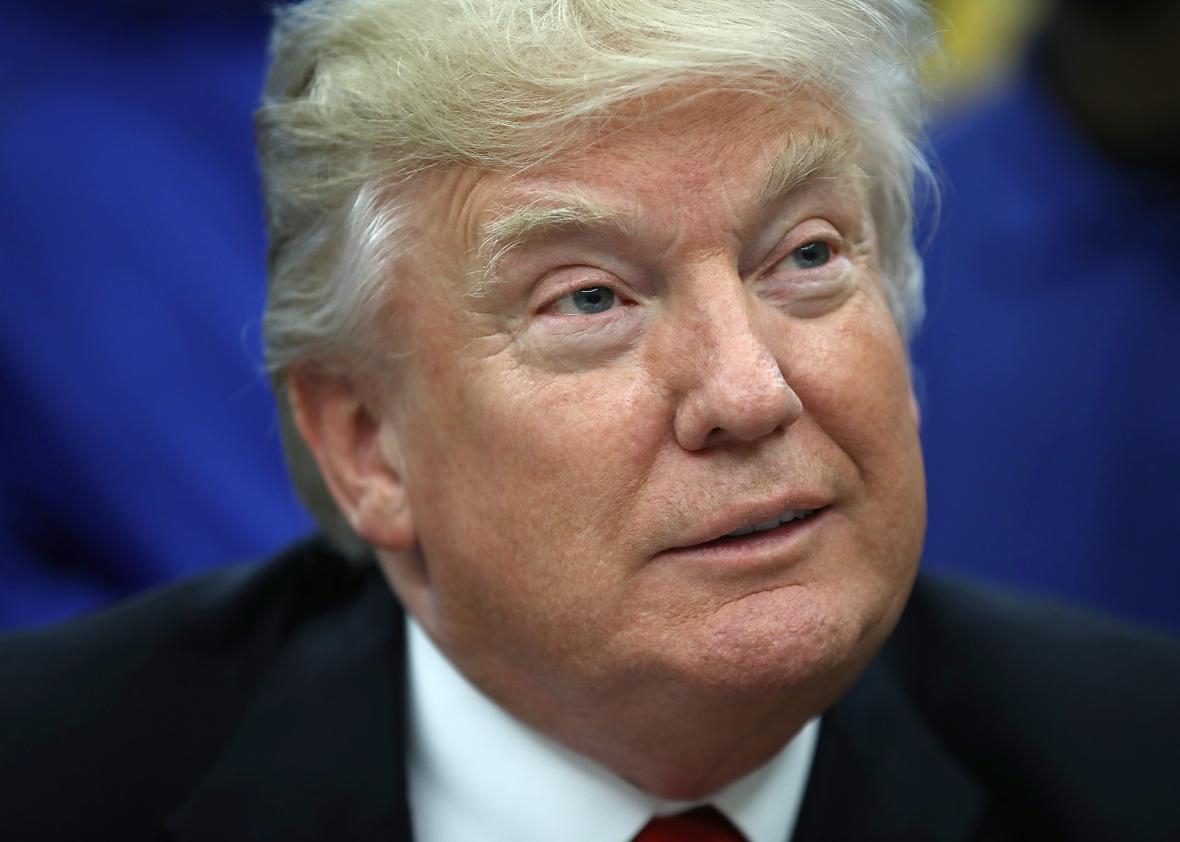On Monday, Politico’s Shane Goldmacher published a piece detailing the ways President Trump gets his news. Beyond skimming the papers and watching cable himself, Trump appears to be informed largely by whatever his aides slip to him. For example, Goldmacher writes that outgoing deputy national security adviser K.T. McFarland recently printed out two Time magazine covers for him:
One, supposedly from the 1970s, warned of a coming ice age; the other, from 2008, about surviving global warming, according to four White House officials familiar with the matter.
Trump quickly got lathered up about the media’s hypocrisy. But there was a problem. The 1970s cover was fake, part of an Internet hoax that’s circulated for years. Staff chased down the truth and intervened before Trump tweeted or talked publicly about it.
Other fake news that has been brought to Trump’s attention includes the work of Chuck Johnson, a pseudo-journalist with a large fan base on the alt-right. Goldmacher writes that an article from Johnson’s GotNews.com accusing deputy chief of staff Katie Walsh of leaking information was printed out for Trump, who then began asking around about her. Walsh no longer works at the White House.
But one of the most troubling accounts in Goldmacher’s piece isn’t about fake news at all. He writes that Trump was recently very impressed by an op-ed published in the paper of record:
[W]hen four economists who advised Trump during the campaign — Steve Forbes, Larry Kudlow, Arthur Laffer and Stephen Moore — wrote in a New York Times op-ed that “now is the time to move it forward with urgency,” someone in the White House flagged the piece for the president.
Trump summoned staff to talk about it. His message: Make this the tax plan, according to one White House official present.
The op-ed came out on a Wednesday. By Friday, Trump was telling the Associated Press, “I shouldn’t tell you this, but we’re going to be announcing, probably on Wednesday, tax reform,” startling his own aides who had not yet prepared such a plan. Sure enough, the next Wednesday Trump’s economic team was rolling out a tax plan that echoed the op-ed.
A certain class of wealthy and underinformed people will take anything published on the Times’ op-ed page that jibes with their priors at face value. It’s not surprising that Forbes, Kudlow, Laffer, and Moore—the One Direction of Reaganomics—wormed their way into Trump’s brain like this. They were, after all, his advisers. But the episode and the piece overall suggest it’s plausible the president will wave around a printout of a Bret Stephens column the next time someone in the White House dares to revive the prospect of a carbon tax—and it won’t be snatched out of his hands because well, it’s the Times, isn’t it? That kind of polished dogma-peddling likely stands out as substantive in a media diet that evidently includes chain-email quality hoaxes, the babble of the Fox and Friends crew, and the latest reporting from the denizens of Kekistan.
Goldmacher’s piece makes it additionally clear that the president isn’t building an actual body of knowledge. Trump, he writes, doesn’t like briefing books and may read the news clippings compiled by communications staff infrequently if at all—unless, of course, they include stories that make him feel better:
White House and former campaign aides have tried to make sure Trump’s media diet includes regular doses of praise and positive stories to keep his mood up—a tactic honed by staff during the campaign to keep him from tweeting angrily.
There is universal agreement among Trump advisers on this: The best way to focus the president’s attention on any story is to tell him about it personally, even if it is in one of the papers he’s already thumbed through. But officials say it’s a high-risk, high-reward proposition because Trump’s frustrations at bad stories can easily boomerang against those delivering him the news.
Feeding Trump the news, then, is like one of the most desperate stages of trying to feed a kid vegetables—broccoli and an effort-neutralizing treat. Only this kid can fire you and nuke North Korea. And like a kid, Trump requires constant management. “When Trump bellows about this or that story, his aides often scramble in a game of cat-and-mouse to figure out who alerted the president to the piece in the first place given that he rarely browses the Internet on his own,” Goldmacher writes. “Some in the White House describe getting angry calls from the president and then hustling over to Trump’s personal secretary, Madeleine Westerhout, to ferret who exactly had just paid a visit to the Oval Office and possibly set Trump off.”
Chief of staff Reince Priebus and staff secretary Rob Porter have reportedly put in place procedures to manage the content Trump receives. But, Goldmacher writes, “Trump advisers are unwilling to give up the chance to directly bend the president’s ear and hand him supporting documents because they have seen how he can be swayed.” So have we.
